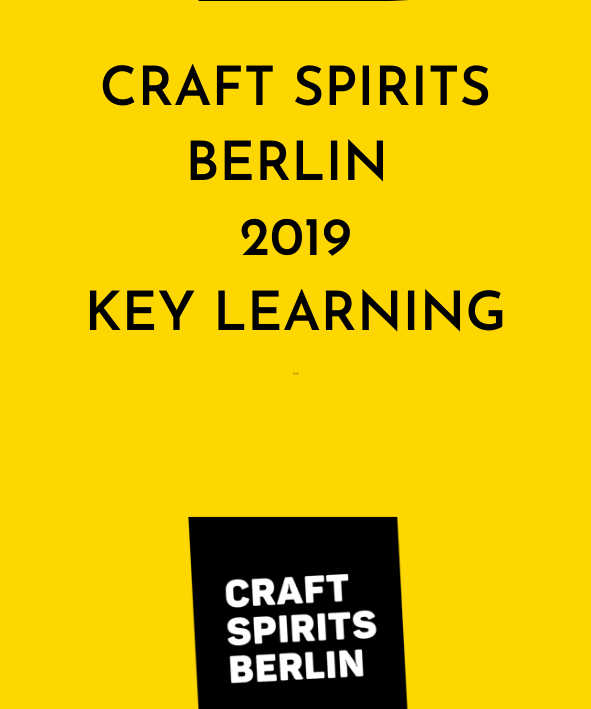A few days after Destille Berlin closed its door of its 8th Edition. What did we learn from Destille Berlin 2019 ?
1. THE CRAFT SPIRITS CATEGORY IS WHERE INCREMENTAL AND MEANINGFUL INNOVATIONS TAKE PLACE. AND IT COMES FROM THE DISTILLERS, NOT FROM A MARKETING DEPARTMENT.
From Copenhagen based Empirical Spirits who won the outstanding innovation award, to Helsinki Distilling Co who presented new flavored vodka or Sasse Brennerei and its Cigar Special cuvee, it seems that craft spirits is where innovations happens, where new processes are being tried behind stills.
And it’s heartening and happy because several fantastic projects will emerge in the coming months.
2. THE CRAFT SPIRITS CATEGORY IS WHERE A REAL BALANCE IS OPERATING BETWEEN THE RESPECT FOR TRADITION AND ITS SUBLIMATION
Craft spirits is a place of innovation but also the opportunity to magnify or rehabilate older products whose reputation. It’s obvious with the Korn renaissance since a few year, but also in some niche products such as the sloe gin by Franz von Stauffenberg.
3. THE CRAFT SPIRITS CATEGORY IS WHERE YOUNGER AND OLDER GENERATIONS MEET
I love how the fair is multi faceted, from enthousiastic newbies with their first gin to older distilleries polishing their products such as Lorenz Humbel or Josef Farthofer, or Fridolin Baumgartner who won the award for the craft distillery of the year, and started his practice in 1983…..
4. LAST BUT NOT LEAST, WE ALSO LEARNED THATSUCH A FESTIVAL IS NOT ONLY A PLACE TO DISCOVER PRODUCTS BUT ALSO WHERE KNOWLEDGE IS PRODUCED
As some of you already know, as least those you read the previous post 🙂 Spiritsfully had the honour to organize the lectures and tastings of the program of the festival.
And it may sounds quite pretentious to celebrate a lectures and tasting programme that one’s has curated. So let’s make things straight: I am not celebrating the programme itself but how the speakers and guests and visitors made it worthwhile!
On Saturday the program was more or less divided (according to speaker’s schedule, some compromises have to be made) into both exploring what the category of craft is or could be, while exploring the obsessions of the days, or what could become an obsession.
Sunday was dedicated to bartenders and craft cocktails as well in depth dive into some less know categories such as German whiskies, Rhum Agricole or Cognac (craft Cognac)!
DESTILLE BERLIN it is 22 events (talks or lectures or podium discussions and demos) over 2 days.
It is actually a lot, a lot more than most of what similar events offer, and most of all it is independently curated and organized.
There is no brand influencing the program, or buying slot to present its products. Of course you can’t prevent a fantastic distiller to mention a product of his or hers, but it will never be the focus of his/her talk and this is an exception in our current landscape.
I’m grateful to all the speakers for respecting this rule and its spirit.
Transparency is essential to a field such as craft spirits. Transparency will also be one of the main topic of the month to come and next year’s program actually.
WHAT IS CRAFT. DISCUSSIONS ABOUT A WORD.
 0. 0.The intro On the tasting side of the lectures and tastings program, early visitors got greeting by delicacies of René Frank, whose restaurant, Coda Dessert Dinning & Bar just been awarded a Michelin star.   2. 2.It was followed by a fantastic presentation by Josef Farthofer who is one of the only producers who organized a closed circuit system and a truly pionneer of organic distiling. Moreover, at his distillery, nothing is lost and every thing is reused from the leftovers of the distillation process becoming manure or the heat of the stills contribute to warmer temperatures at a nearby school. It was quite impressive and inspiring to hear Josef and Doris Farthofer about their full commitment and how a preoccupation for the best and organic products led to a sustainable development of the distillery way before the word came into fashion.. It seems who wants to use the word craft has to think about being organic!  4. 4.Last but not least, who is thinking craft have to think innovation! That was our last take away of the day with Mikko Mikkänen from the Helsinki Distilling Co.. It proved it with 4 different products that are have been only available to lucky visitors. Baijiu inspired gin or Rhubard flavored vodka with a twist. Craft distillers are inventors.  |  1. 1.Saturday started with a conversation about how craft spirits can learn from craft beers and natural wines with Theresa Bullmann (Atelier du Bouilleur), Katharina Kurz (Brlo), Alex Rehberger (Viniculture), Johannes Schellhorn (Freundschaft), Theo Ligthart (FMK). Takeaway? Concerns are the same even though the wording “craft vs nature” is still confusing and maybe inadequate. It seems “craft” came straight from the US while it took a different meaning once in Europe. “Craft beers and spirits producers are putting on emphasis on sustainability, organic products, etc and not only on the “hand-made”. The “by who is important” but the “how” even more. It feels a cross atlantic debate “US craft vs. EU craft” is more than needed!  3. 3.After Josef Farthofer, Erwan Castain from Pimlica showed how companies making spirits have many tools at their disposal to be sustainable (from reusable bottle to inventive packaging). That was a great transition after Josef Farthofer’s experience. What was a singular experience in the 80s, becomes a generational compulsary thinking 40 years after. It seems who wants to use the word craft has to think about sustainibility!  5. 5.Craft Distillers Unite! That could be the motto of the gatherings of (so far) French producers who all signed the Natural Booze Manifesto, as Theresa Bullmann explained us. Inspired by the values behind several Natural Wines associations, this manifesto is defining a set of ideas they agree with such as: We distill in manually operated copper stills (no automation, no continuous distillation). We obtain our base from organic quality farming (with or without official label). We’ll make a special post about it soon. So we keep it short here! Takeaway? Destille is great for that, producers can meet and exchange ideas. |
NEW TECHNIQUES. NEW TRENDS. LEARNING. TASTING.
 What is the fuss about fermentation? What is the fuss about fermentation?With Markus Shimizu and Robert Schröter visitors could explore the world of fermentation from the point of view of someone making Koji or Miso (Markus) and the point of view of a bartender (Robert). |  Top left: Amazake. Top left: Amazake.Below: white rum pickled in Koji-fermented rice. Top right: white rum pickled in roasted and koji-fermented rice. |
 How to keep ingredients all winter long? The topic of fermentation came back into the conversation with Ruben Neideck from the Velvet bar, who gave the most extraordinary and generous talk on how a bartender who lives in Berlin, who wants to work locally but does not want to have red beet cocktails for 6 months can do to survive winter. He reviewed many less known and more known methods to keep ingredients. How to keep ingredients all winter long? The topic of fermentation came back into the conversation with Ruben Neideck from the Velvet bar, who gave the most extraordinary and generous talk on how a bartender who lives in Berlin, who wants to work locally but does not want to have red beet cocktails for 6 months can do to survive winter. He reviewed many less known and more known methods to keep ingredients.That was intense!    What do spirits lover indulge with in the East? What do spirits lover indulge with in the East?Dagmar Maas (tonbo) and Matthias Heger (mingriver) along with Tuan Anh Nguyen (Wagner Cocktail Bistro) offered a discovery tour of spirits and drinks from Asia to the visitors that woke up early enough on Sunday. While Dagmar Maas succeeded to explain sake in 15 minutes, Matthias Heger did the same with Baijiu in only 10! Tuan Anh Nguyen who just had been awarded the Farm to Shaker Bartender of the Year 2019 the night before concluding with two great cocktails, one using sake, the other one Baijiu.  Why wood matters? Why wood matters?Markus Eder, from the eponymous famous vat making company, focused on the influence of wood on spirits in great detail. This lecture was an eye opening one providing insider information to the lucky visitors, usually this knowledge is shared only by professionals. This time, a door opened!  What are bitters? What are bitters?Brian Mazurek detailled beautifully how he produces his bitters but first of all described their origin and the challenges producers are facing, in the most lively and funny way. We learned about the history and also the specificities of outsourcing in California.  Who works with fresh sugar cane juice outside of France? Who works with fresh sugar cane juice outside of France?Pascal Kählin made everyone taste Rum made like Rhum agricole (=) but not in France. Rhum agricole like Champagne or Tequila is indeed an AOC (Protected). Who already tasted a Rhum from Madeira or Mexico?  How to find out what you really like? How to find out what you really like?With Angela Loi, the early risers on Sunday learned many tasting tricks to have a clearer idea of how taste works and how to find out what’s your favorite drink may be. Tricks? What are you drinking in the morning? Tea or coffee? And how do you like your coffee? How much does it say about your appreciation of bitterness and sweetness?  How is the EU changing the way we gonna drink? How is the EU changing the way we gonna drink?Werner Albrecht, from the BMEL (Ministry in charge for spirits in Germany) came to explain to both consumers and producers the new rules concerning spirits, and their labelling that will be soon implemented (a special post will arrive soon about it). |  How to use fruit brandies in the bars? Lorenz Humbel, the master of Kirchwasser (and like Josef Farthofer of the pionneers of organic distilling) met with Anne Linden, one of the bartender of the Bar Am Steinplatz in Berlin to discuss fruit brandies. Not only that was great to learn so much in so little time about this demanding category but it was even greater to have the possibility to try both the pure spirit and the spirit in a cocktail. How to use fruit brandies in the bars? Lorenz Humbel, the master of Kirchwasser (and like Josef Farthofer of the pionneers of organic distilling) met with Anne Linden, one of the bartender of the Bar Am Steinplatz in Berlin to discuss fruit brandies. Not only that was great to learn so much in so little time about this demanding category but it was even greater to have the possibility to try both the pure spirit and the spirit in a cocktail.What a great way to train one’s palate!  How did spirits taste like in the past? How did spirits taste like in the past?Another lecture that attracted the crowd was the one of Guillaume Ferroni. He indeed went back to the origins of spirits, when it was still the realm of alchemists, candy makers or pharmacists to eventually offer a tasting of old spirits recipes he re created. The day after he came back to explain what pastis actually is and presented several examples. And the best Mauresque cocktail ever.  Is there such thing as a craft Cognac? Is there such thing as a craft Cognac?Max von Olfers (Cognac Expert) taught the difference between craft and non craft cognac. We keep it short here, as Spiritsfully will come back with a detailled interview about the idea of craft cognac soon. It is indeed much needed.  Is there such thing as good Korn today? Is there such thing as good Korn today?Rüdiger Sasse (Feinbrennerei Sasse), Björn Bochinski (Feinbrennerei Sasse), Johannes Schüller (Zorn Korn), Dirk Böckenhoff (Böckenhoff), Theo Ligthart (das Korn, Steinreich) answered to the question: is there good korn to find now. And the answer is YES.  How does cereal taste? How does cereal taste?Cathrin Brandes concluded the day on Sunday with a cereal tasting. We reviewed rye, wheat, spelt and barley in a slightly germinated version, as bread, as bread and as a distillate. Everyone loved the barley bread! It is so rare (as the production goes into spirits…) That was a really unique opportunity to understand the pure taste of cereals to allow the possibility to recognize and appreciate the work of distillers, how much some of them sublimate their products…..  How will the bar of the future look like? How will the bar of the future look like?Youssef Louanjli and Franck Audoux, from Cravan in Paris, showed us how a bar could look like. We all know French Café, where from 8 to 8 you always find coffee and something to eat. In Cravan, not only you find the best coffee (Youssef Louanjli created Fragments some years ago a pionneer of Third Wave coffee in Paris) but also the best products (from hot-dogs to croque-monsieur) but also the best paired cocktail all day long. New Parisian have a place where they can indulge and diversify their usual wine diet.  Is there such things as German whiskies? Is there such things as German whiskies?Christian Schrade from Idea Distillers drew a very enthiusiastic map of German whiskies.   |
Thanks to Anna Warnow for the beautiful pictures !




